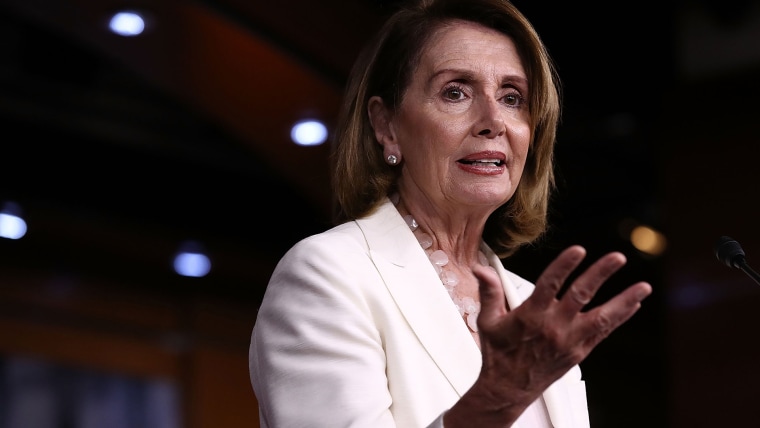Donald Trump went toe to toe with Nancy Pelosi during the recent government shutdown, and five weeks after she told him to blink, he did.
The latest CNN poll, released yesterday, showed her public support rising accordingly.
If there is a political winner to come out of the most recent shutdown, the poll suggests it is the Speaker of the House of Representatives, Nancy Pelosi. Her favorability ratings have risen 8 points since December, buoyed by a 22-point rise in favorability among liberal Democrats (from 65% favorable in December to 87% favorable now). Neither Trump nor Senate Majority Leader Mitch McConnell have seen meaningful growth on this measure over the same time frame.Pelosi's 42% favorable rating (47% see her unfavorably) is her best result on this question in CNN polling since April of 2007.
It'd be a stretch to suggest a national leader with a 42% favorable rating is necessarily popular, but looking at the same survey results, the House Speaker's rating is now identical to Trump's and well above Senate Majority Leader Mitch McConnell's (R-Ky.) 30% favorable rating.
All of this comes on the heels of a different national poll that found on the issues that matter most to Americans, the public sides with Pelosi over Trump.
Circling back to our earlier coverage, I think results like these matter, if only to prompt some reevaluation of long-held assumptions about the congresswoman's public standing.
Among some Democrats, there was a fair amount of anxiety after the 2018 midterms about elevating Pelosi to Speaker, not because she'd failed to earn it, but because she was perceived as broadly unpopular to the point of toxicity with the American mainstream.
And among Republicans, it’s simply assumed that the California Democrat is seen as a villainous “San Francisco liberal.” Ahead of many recent elections, GOP officials and their political allies reflexively run attack ads – occasionally in races that are unrelated to the U.S. House – trying to tie Democratic candidates to Pelosi.
In last year’s special election in Ohio’s 12th congressional district, for example, Republicans and their outside allies spent millions of dollars blanketing the airwaves, and roughly a third of their ads referenced the then-House Minority Leader.
About a year earlier, when Republicans were quite concerned about losing special elections in Montana and Georgia, GOP leaders made no effort to hide their strategy: they’d just keep complaining about Pelosi and count on conservative voters to have the conditioned, knee-jerk response.
“I think we’ll see if it works,” then-NRCC Chairman Steve Stivers (R-Ohio) said. “I believe it still works.”
According to the new book from Cliff Sims, a former aide in Trump’s White House, the president told then-House Speaker Paul Ryan (R-Wis.), in reference to Pelosi, “Have you seen her? She’s a disaster. Every time she opens her mouth another Republican gets elected.”
And yet, despite all of these assumptions about the public’s contempt for Pelosi, there's some compelling evidence that her support is on the rise.
